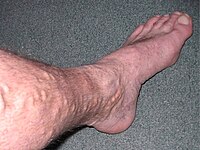
Photo from wikipedia
PurposeTo assess the feasibility, safety and clinical outcomes of image-guided percutaneous thermal ablation as salvage therapy for local recurrence of renal cell carcinoma (RCC) in patients initially treated surgically with… Click to show full abstract
PurposeTo assess the feasibility, safety and clinical outcomes of image-guided percutaneous thermal ablation as salvage therapy for local recurrence of renal cell carcinoma (RCC) in patients initially treated surgically with curative intent.Materials and MethodsA retrospective review of 11 consecutive patients (M/F = 8:3, mean age = 76 years) who underwent computed tomography (CT)-guided thermal ablation for locally recurrent RCC after partial (72%, 8/11) or radical nephrectomy (28%, 3/11) with a mean time to recurrence of 48 months (range 2–156). Assessment of technical success, complication (peri- and post-procedural), oncological outcome and survival analysis were performed. Patient baseline and follow-up renal function surrogates including creatinine level (Cr) and estimated glomerular filtration rate (eGFR) were statistically compared.ResultsEleven biopsy-proven recurrent RCC measuring 1.4–3.9 cm (mean = 2.8 cm) were treated with CT-guided thermal ablation. Technical success was achieved in 100% (11/11) of the cases. There were no major complications except for one (9%) asymptomatic hemorrhage (Clavien–Dindo grade I complication). Complete response, local progression-free and overall survival rate were 91, 91 and 82% during the mean follow-up time of 2.5 years (range 0.1–7.1). Renal function was overall stable without significant change at 1 month and last follow-up (p = 0.21; GFR, p = 0.10; creatinine).ConclusionsImage-guided percutaneous thermal ablation is a feasible, safe and effective for local recurrence after nephrectomy, representing a non-surgical alternative for unresectable disease.
Journal Title: CardioVascular and Interventional Radiology
Year Published: 2018
Link to full text (if available)
Share on Social Media: Sign Up to like & get
recommendations!